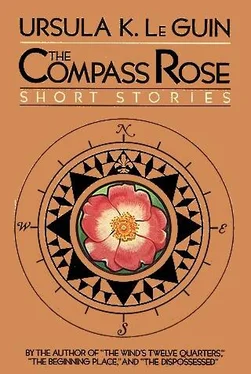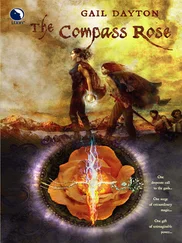“I don’t think you do know,” she said abruptly. “Pointlessness isn’t your line. It’s mine. I was intended to lead a pointless life, like my parents and my brothers. By some mistake I got into a highly rewarding life with a point to it. Just the sort of life you were intended for. And then you, of all people, meet up with this, with the drunk on the highway, with waste and senselessness, when you’re only twenty-five. Another mistake, no doubt. But it’s not essential, Edward. Mary’s death is not going to be the essential event in your life. To accept it as essential, to accept pointlessness, would be—for you—an act of cowardice.”
“Maybe,” he said. “But the fact is, Harriet, that I, lately, that I seem to have about reached my limit.”
She was frightened by his anguish, diffident as it was. She did not know much about anguish, only about misery, the endurable unending pain not the destroying one. She tried now to back away from the point of agony, saying, “Well, a limit’s always a beginning…” What she feared was his crying. Twice here in this room with her he had broken down and wept, once when he was first home from hospital after the wreck, then again months later. She dreaded his tears, the coping with pain at second hand. It shattered her to pity as to be pitied. When he got up suddenly from the low hearth seat she sat tense. But he said only, “I’d like another shot. You?” He took her glass and went off to the kitchen. As he went the clock behind her on the mantel struck twelve solemnly, taking a long time about it; and now it was November not October. They had lived another month. Here she sat by the fire, there was Edward opening cupboards in the kitchen, both of them warm and full of good bourbon; and then there was Mary, eighteen months dead. Was it because she was a hard woman that she had not really wept for her child’s death? If she had died before John, I would have cried for her, Harriet thought.
Edward returned, sat down, stretched out his legs. “I have tried,” he said with such serious equanimity that she lost all fear of his breaking down and waited to find out what he meant. He was candid but inarticulate, and his mind, trained to the rigors of chemistry, pursued logic into places where it does not exist. “I’ve honestly tried,” he repeated, lapsed into silence, crossed his ankles, drank thoughtfully, and at last went on, “Technician in the med-ical department. Elinor Schneider. Fairly good-looking, blond, very intelligent. She’s around my age.” (Older, thought Harriet.) “Well, so…” Edward paused, raised his glass in self-mocking salute. “I tried.”
“To?”
“To get interested.”
Poor Elinor Schneider, lying awake now perhaps seeing in the dry darkness his face. Pain is self-centered. Harriet sighed a little. “I suppose a laboratory is the place for an experiment…”
“Anyway, it was an effort to reconnect, whatever you want to call it. It didn’t work. I can’t do it. I don’t want to do it. I know you think me weak.”
“You? I certainly don’t. And if I did, what then? You know yourself best.”
“No, I don’t, Harriet. You’re really the first person who seems to know much about me. To judge me objectively. My parents…” He was the child of a divorce, passed back and forth from father and wife to mother and husband, a bone of contention. He let that go, but added, “And Mary and I were rather stupid about each other, in some ways.”
“You were very young.”
“We had no time,” he said, so clear and quiet in his statement of the chance lost that Harriet sat still, outclassed, rejoicing in being outclassed.
“So,” he said, pursuing logic, “in you I see the first clear reflection of myself. It looks weak.”
“The mirror is old, it warps.”
“No; you see people very justly.”
“Do you really want to know how I see you?” she demanded, for he had poured her a strong drink and she wasn’t used to a second nightcap. He did want to know. “As a bright and fortunate man,” she said after seeking the words. “Fortunate, not lucky. You haven’t had much luck. And yet you’ve been fortunate. You got your freedom early, too early, but then a lot of people never get it. You’ve known real passion, real fulfilment, and no letdown. You never will know the letdown, the dead level. You got into manhood a free man, and you’ll go on free,or—” But the “or” had carried her too far. Had she been younger, his equal, she could have finished the sentence, “or you’ll kill yourself.” But between generations there should not be talk of death. Of the dead, yes, of dying, yes, of your death, no. Tabu, Harriet told herself, disgusted at her whole speech. Edward however seemed pleased or intrigued; he brooded over it a while. Then he said, “Another thing about Elinor, this girl at the lab, she likes kids. I always think of Andy.”
“Andy’s got me, Edward, he’ll survive, for mercy’s sake. Nobody’s asking you to marry a nursemaid! God forbid!”
He looked relieved, but slowly, through the mists of weariness and whiskey, she perceived that Elinor had turned up again.
“When I said you’d find that you couldn’t withdraw, couldn’t disengage yourself, disconnect yourself, you know, I was warning you. You’re in a very vulnerable position. You could get caught. I don’t want to see you caught.” As you were by Mary, she thought; for she believed her daughter had married less for love than self-assertion, even envy. She knew in Mary, under the dark soft vivacity and Italian grace, the hard destructive strain from her side, the fecklessness, the pointless yen that brought them all in the end to the County of Malheur. She had never been able to weep much for Mary, she had never been able to judge her; yet it was very bitter to think, as she had thought before, that Mary’s early death might prove a fortunate thing for the man who loved her.
“You spoil me, Harriet,” said the young man, gravely considering.
“Of course I do. But I don’t spoil your son. I discriminate between incorruptibility and mere innocence.” She gave a short laugh of pleasure at her own multisyllables. “I’m getting verbose, I’m going to bed. Good night.”
“Good night,” he answered reluctantly as she went to the stairs, so reluctantly he almost held her back. As if he need worry about “reconnecting.” He had never, even in the worst of his pain, withdrawn himself, ceased to give to those who needed him. What he had left, the baby and the old woman, he loved with perfect generosity. And there was no denying that the three of them got on pretty happily. At least I’m a good stopgap, she thought with pride.
Since her husband’s death four years ago she had not slept well at night. Half the dark hours she waked and read, and was up often before the baby started chirping. So she remembered her mother in old age, in the silent kitchen lit by a kerosene lamp, looking in silence out the window at the huge sky paling above the sagebrush plain. But this night Harriet slept at once, falling into a nightlong trap of dreams. They kept coming and telling her that someone was dead, but would not tell her exactly who, or whether he was dying now or dead already; only once, in a summerhouse she had not known was in her garden, she found him lying huddled on the floor, one long arm thrown out, but that was only the empty sleeve of a grey suit. She ran away in terror into an older nightmare, fifty years older, of the blind thing that hunted her over the desert. At last sunlight broke down the walls and horizons of the dreams and woke her, yet it did not illuminate her fear. She denied that her anxiety had been for Edward, but she was rather grim with him at breakfast. All morning she housecleaned, making the baby play by himself, trying to work off that fear before her conscience made her accept it as a rational one.
Читать дальше




